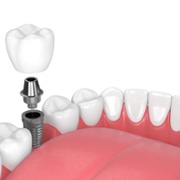Implants

We specialize in helping our patients achieve the smile that they want and deserve with quality implants.
Implants
About Dental Implants
With nearly 40 million Americans having lost some or all of their teeth, dental implants are a popular option for replacing those lost teeth. Implants are comfortable, attractive and will help you regain confidence in your smile. They are an alternative to bridges, partials, and dentures. Implants can look and feel like natural teeth. An implant simply is a metallic titanium object that is inserted into your jawbone to act like a natural tooth root. Titanium isn't recognized by the body's immune system, so it is not rejected as an implant. It integrates with the jawbone to give firm support to the artificial replacement that it will support.
Reasons for Implants
- No worrying about dentures falling out - a stable foundation
- Improves biting pressure
- Insufficient teeth amount or jaw structure for other types of replacements
- Restores proper chewing ability which leads to a better diet and improved overall health
- Eliminates tooth shifting
- No loose dentures
- No gooey denture adhesives
- Improves speech
- Won't apply damaging pressure to your natural teeth
- Comfort and fit
- Help preserve healthy vital tooth structure (unlike a bridge)
- Increase your self-confidence when talking and smiling
Ideal Candidates
Generally, candidates for dental implants should be in good health, have healthy gums, good oral habits for the aftercare and a healthy jawbone to support the implants. Your dental implants can adversely be affected by some chronic diseases, existing dental problems, diabetes, bone disorders, smoking, and alcohol. Your doctor can evaluate your situation to determine if dental implants are the best option for you.
Risks Associated with Implants
Complications are rare with implant procedures. When infections or other complications occur. Medication or surgical intervention may be used to treat it. Oral surgery may incur damage to the nerve that controls the sensation. Such complication is rare and may be temporary or permanent. In addition, there is a risk of bleeding, swelling, bruising, infections, discomfort, cosmetic problems, and damage to other natural teeth. Ask your surgeon to provide more information about the risks involved with this procedure.
Procedure
Implant placement does require several steps over a period of time ranging from 3 months to over 1 year depending on your specific needs. Here are the steps followed for implant therapy:
- The implant is inserted into the jawbone and allowed to heal for several months
- A post is attached to the implant and a temporary artificial tooth is used
- A permanent tooth is attached after all healing is complete
Caring for your Implants
To avoid loss of your implants, brushing, flossing and regular dental visits are recommended. If properly cared for, your implants can last a lifetime. Your dentist will monitor our healing and give you more detailed instructions. The better care you take of your implants, the most satisfied you will be with the results.
Implants and Insurance
Typically implants are not covered by insurance providers. However, the investment of a healthy smile can be priceless. Discuss financial arrangements with your dental care provider.
If you have any questions on dental implant choices, procedures and care please contact us today.